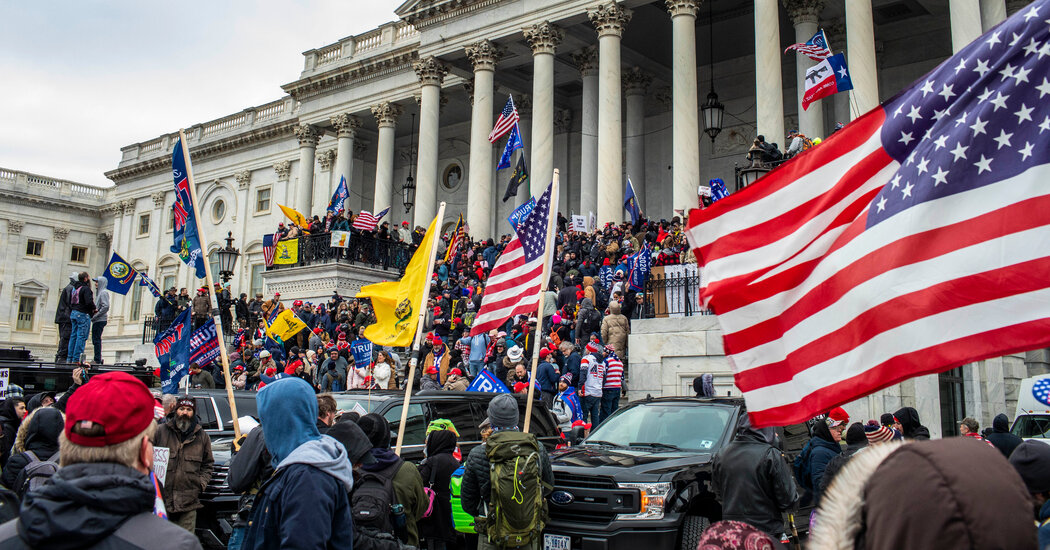The Supreme Court sided on Friday with a member of the mob that stormed the Capitol on Jan. 6, 2021, saying that prosecutors had overstepped in using an obstruction law to charge him.
The ruling may affect hundreds of other prosecutions of rioters, as well as part of the federal case against former President Donald J. Trump accusing him of plotting to subvert the 2020 election. But the precise impact of the court’s ruling on those other cases was not immediately clear.
Chief Justice John G. Roberts Jr., writing for the majority, read the law narrowly, saying it applied only when the defendant’s actions impaired the integrity of physical evidence.
Lower courts will now apply that strict standard, and it will presumably lead them to dismiss charges against many defendants.
The vote was 6 to 3, but it featured unusual alliances. Justice Ketanji Brown Jackson, a liberal, voted with the majority. Justice Amy Coney Barrett, a conservative, wrote the dissent.
Most Jan. 6 defendants have not been charged under the law, which prosecutors have reserved for the most serious cases, and those who have been charged under it face other counts, as well. The defendant in the case before the justices, Joseph W. Fischer, for instance, faced six other charges.
Nor was it clear that a ruling in Mr. Fischer’s favor would erase the two charges against Mr. Trump under the law. Jack Smith, the special counsel overseeing the federal election interference case against the former president, has said Mr. Trump’s conduct could be considered a crime under even a narrow reading of the law.
In any event, the former president faces two other charges unrelated to the law, part of the Sarbanes-Oxley Act of 2002.
In a separate case, the justices will soon decide whether Mr. Trump is immune from prosecution. The court’s ruling could render moot questions about whether the 2002 law covers his conduct.
The Supreme Court has said that the purpose of the law, prompted by accounting fraud and the destruction of documents, was “to safeguard investors in public companies and restore trust in the financial markets following the collapse of Enron Corporation.”
The question for the justices in the case, Fischer v. United States, No. 23-5572, was whether the law could be used to prosecute Mr. Fischer, a former Pennsylvania police officer.
According to the government, Mr. Fischer sent text messages to his boss, the police chief of North Cornwall Township, Pa., about his plans for Jan. 6. “It might get violent,” he said in one. In another, he wrote that “they should storm the capital and drag all the democrates into the street and have a mob trial.”
Prosecutors say that videos showed Mr. Fischer yelling, “Charge!” before pushing through the crowd and entering the Capitol around 3:24 p.m. on Jan. 6. He used a vulgar term to berate police officers, prosecutors said, and crashed into a line of them. He was, the government’s brief said, “forcibly removed about four minutes after entering.”
Mr. Fischer’s lawyers, by contrast, stressed that he had attended the rally on the Ellipse but was not part of the initial assault.
“When the crowd breached the Capitol, Mr. Fischer was in Maryland, not Washington, D.C.,” his lawyers wrote in their brief. “He returned after Congress had recessed.”
“His earlier Facebook posts about violence, when read in context, refer to his belief that antifa planned to disrupt the rally,” they continued. He had yelled, “Charge!” in “obvious jest,” they added.
In disrupting the certification of Joseph R. Biden Jr.’s electoral victory, prosecutors said, Mr. Fischer had obstructed an official proceeding in violation of the 2002 law, which was principally concerned with the destruction of evidence.
Indeed, at least part of what the law meant to accomplish was to address a gap in the federal criminal code: It had been a crime to persuade others to destroy records relevant to an investigation or official proceeding but not to do so oneself. The law sought to close that gap.
It did that in a two-part provision. The first part made it a crime to corruptly alter, destroy or conceal evidence to frustrate official proceedings. The second part, at issue in Mr. Fischer’s case, makes it a crime “otherwise” to corruptly obstruct, influence or impede any official proceeding.
The heart of the case is at the pivot from the first part to the second. The ordinary meaning of “otherwise,” prosecutors said, is “in a different manner.” That means, they said, that the obstruction of official proceedings need not involve the destruction of evidence. The second part, they say, is a broad catchall.
Mr. Fischer’s lawyers countered that the first part must inform and limit the second one — meaning that the obstruction of official proceedings must be linked to the destruction of evidence. They would read “otherwise” as “similarly.”
The U.S. Court of Appeals for the District of Columbia Circuit disagreed, with Judge Florence Y. Pan writing that “any discrepancy between Congress’s primary purpose in amending the law and the broad language that Congress chose to include” must be resolved “in favor of the plain meaning of the text.”
In dissent, Judge Gregory G. Katsas wrote that the second part of the provision applied “only to acts that affect the integrity or availability of evidence.”
The government’s interpretation, he wrote, “would sweep in advocacy, lobbying and protest — common mechanisms by which citizens attempt to influence official proceedings.”
